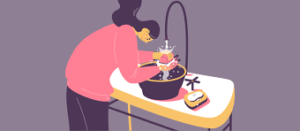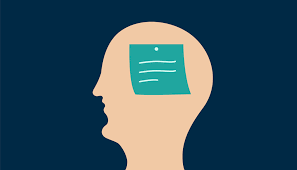Obsessive-compulsive disorder (OCD) is a mental health disorder that can affect individuals in different ways. For some, it might manifest as an overwhelming need for order and balance. For others, it may present as persistent fears of something bad happening if a certain routine isn’t followed exactly as planned. Regardless of the form it takes, people who suffer from OCD often develop rituals to cope with their symptoms. In this blog post, we’ll explore what these OCD rituals look like and how to best deal with them. We will also discuss ways to manage your OCD so you can live a healthier and happier life.
Contents
What are OCD Rituals?

There are many different types of OCD rituals, but they all have one thing in common: they are repetitive behaviors or thoughts that a person feels compelled to do to relieve anxiety or prevent something bad from happening.
Some common OCD rituals include washing and disinfecting hands or body parts, counting and recounting items, ordering and rearranging objects, checking locks and appliances, repeating words or phrases, and avoidance of certain people, places, or things.
These rituals can be time-consuming and interfere with a person’s daily life. They may cause distress and anxiety if they cannot be performed perfectly or if they are interrupted. In some cases, OCD rituals can be so severe that a person is unable to leave home or perform basic self-care tasks.
If you or someone you know is struggling with OCD rituals, it is important to seek professional help. Cognitive behavioral therapy (CBT) is an effective treatment for OCD that can help a person learn how to manage their anxiety and reduce their compulsions.
Why Do People Engage In OCD Rituals?
There are many reasons why people with OCD engage in rituals. For some, rituals may provide a sense of order and control in an otherwise chaotic world. For others, rituals may be a way to reduce anxiety or calm fears. Still, others may engage in rituals because they believe that if they do not, something bad will happen.
Whatever the reason, it is important to remember that OCD rituals are not voluntary; they are driven by the compulsion to perform the ritual to alleviate the anxiety that comes with the obsessions. OCD sufferers often know that their thoughts and behaviors are irrational, but they cannot help themselves.
Some of the other reasons why people with OCD engage in rituals include feelings of guilt or shame, trying to gain approval or acceptance from others, and attempting to “undo” bad thoughts. Again, it is important to remember that OCD sufferers are not engaging in rituals out of choice; they are driven by the compulsion to perform them.
Also, it’s important to note that OCD rituals can become more severe over time. If you or someone you know is struggling with OCD, it is essential to seek professional help as soon as possible.
What are Some Common OCD Rituals?
There are many different types of OCD rituals, but some of the most common include:
- Checking: This is perhaps the most common type of OCD ritual. People with OCD feel the need to check things repeatedly, such as door locks, appliances, and even their body parts.
- Washing and cleaning: People with OCD often have very strict routines when it comes to washing and cleaning. They may wash their hands multiple times or clean certain areas of their home over and over again.
- Counting: Many people with OCD feel the need to count certain things, such as steps, objects, or even breaths.
- Arranging and ordering: Some people with OCD like everything to be in a certain order or arranged a certain way. This can include arranging items in a specific order or making sure that all furniture is symmetrical.
- Hoarding: Many people with OCD hoard items for fear that they will need them at some point in the future. Others may hoard because they believe that these items have sentimental value. This type of behavior can be very dangerous as it can lead to unsanitary conditions and a risk of fire.
- Consistently seeking reassurance: People with OCD may often seek reassurance from others to alleviate their anxiety. They might ask the same questions repeatedly or need constant affirmations of their worth.
These are some of the rituals for OCD that are most commonly seen, but there are many other types of compulsive behaviors as well. If you or someone you know is struggling with OCD rituals, it’s important to seek professional help and develop a plan for managing the disorder. With treatment, it is possible to gain control over your symptoms and lead a more fulfilling life.
How Do OCD Rituals Impact Someone?

The ceremonies and rituals associated with OCD can be both mental and physical. Mental compulsions might include repetitive thoughts or mental images. Physical compulsions might include washing or cleaning rituals, ordering or rearranging objects, or touching objects in a certain way. Regardless of the form the compulsions take, they are all driven by a fear of contamination or harm.
The constant anxiety and fear that comes with OCD can lead to feelings of isolation and loneliness. The repetitive nature of the disorder can make it difficult for people to maintain close relationships. In severe cases, people with OCD may become housebound or even hospitalized due to their inability to cope with their fears.
Some of the consequences of OCD rituals can include :
- Difficulty with daily activities, school, and work
- Poor concentration and focus
- Low self-esteem
- Relationship problems
- Lack of motivation or energy
- Depression and anxiety
- Feelings of guilt or shame related to the disorder.
These are some of the reasons why professional help is often needed to manage OCD rituals effectively.
How Can OCD Rituals be Treated?

The first step in treating OCD rituals is to recognize that they are driven by the compulsion to perform them, and not out of choice.
Once this understanding is established, individuals can work with a mental health professional to develop strategies for managing their anxiety and reducing compulsive behavior.
Some of the treatment methods for OCD include :
Cognitive Behavioral Therapy (CBT)
Cognitive behavioral therapy (CBT) is an effective form of therapy that helps individuals identify and modify distorted thoughts and beliefs that contribute to their anxiety and OCD rituals. This type of therapy works by helping individuals learn how to recognize when their thoughts are irrational, as well as teaching them coping skills for managing stress and anxiety.
Exposure Therapy
Exposure therapy is another form of treatment for OCD rituals. This type of therapy helps individuals gradually confront their anxiety and compulsive behaviors in a safe environment. Over time, exposure to the things that trigger their anxiety will help them learn how to manage it more effectively.
Medication
Medication may be prescribed to help manage OCD symptoms. Common medications used for treating OCD include selective serotonin reuptake inhibitors (SSRIs) as well as tricyclic antidepressants. However, it is important to discuss any potential side effects with your doctor before starting a new medication regimen.
These medicated treatments, combined with talk therapy and lifestyle modifications like relaxation techniques and exercise can help individuals learn to manage their OCD rituals healthily.
Lifestyle Changes
One of the most important parts of managing OCD rituals is making lifestyle changes. This can include setting up a regular sleep schedule and engaging in relaxation techniques. These are like yoga and meditation, and avoiding substance use. Additionally, getting involved in activities that bring joy and pleasure is also beneficial for managing anxiety symptoms.
Conclusion
OCD rituals can be a debilitating aspect of OCD but with the right help, it is possible to manage these behaviors. It’s important for anyone suffering from OCD and its associated rituals to seek professional help as soon as possible to reduce their anxiety and gain back control over their life. There are a variety of treatments available including cognitive behavioral therapy, medications, lifestyle changes, relaxation techniques, and more. With the proper guidance and care from qualified professionals, individuals struggling with OCD can improve their quality of life significantly.
For more information and guidance, please contact MantraCare. OCD is a mental health disorder characterized by obsessions and compulsions. If you have any queries regarding Online OCD Counseling experienced therapists at MantraCare can help: Book a trial OCD therapy session


